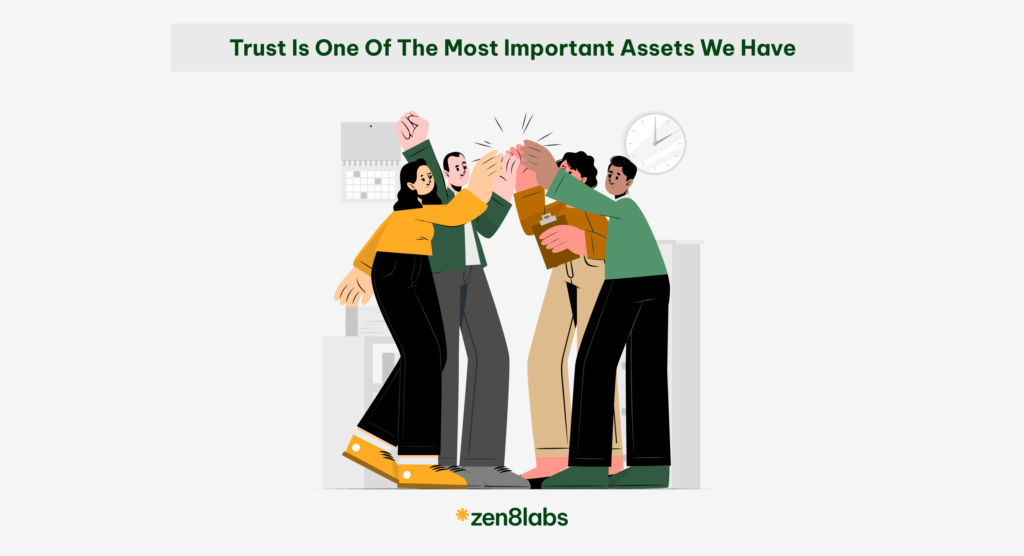
Trust is the foundation of any successful team. When team members trust each other, they work more effectively, communicate openly, and are willing to support one another through challenges. On the other hand, a lack of trust can lead to conflicts, poor performance, and division within the organization.
Therefore, as I mention in my ‘Lead yourself first, lead your team later’ post everything starts from you, hence let’s start at the same point this time. So, how do you build and maintain trust within your team and yourself? Here are some key strategies you can implement:
Communicate transparently
Transparency in communication is essential for building trust in a team. It ensures that everyone is on the same page, reducing misunderstandings and fostering a culture of openness. Here are two key aspects of trust related to transparent communication:
Being transparent means being honest about your thoughts, intentions, and decisions. When you communicate openly, you demonstrate confidence in your own values and leadership. It also shows that you are accountable for your actions, making it easier for others to trust you.
When team members communicate transparently, they foster a sense of psychological safety. This means they feel comfortable sharing ideas, concerns, and feedback without fear of judgment. Open dialogue encourages collaboration and ensures that everyone works towards common goals with mutual respect.
Keep promises and act consistently
Trust is not built on empty words but on real actions. If you make a promise to your team, ensure you follow through. Consistency in behaviour helps establish strong trust among team members.
Keeping promises and acting consistently starts with self-trust. When you commit to something and follow through, you reinforce confidence in your own abilities. Being reliable in your actions helps you stay accountable and builds your self-discipline, making it easier for others to trust you.
A trustworthy team is one where members consistently keep their word. If promises are broken, trust erodes, leading to scepticism and disengagement. When leaders and team members act consistently, they set clear expectations and create a culture where reliability and responsibility are valued, strengthening overall team cohesion.
Show respect and listen to everyone’s opinions
Respecting others starts with self-respect. When you value your own thoughts and contributions, you are more likely to appreciate the perspectives of others. Listening actively and considering different viewpoints without feeling threatened builds confidence and demonstrates emotional intelligence.
A culture of respect strengthens team bonds. When each member feels heard and valued, they become more engaged and willing to collaborate. Encouraging open discussions and valuing diverse opinions fosters innovation and problem-solving, leading to a more cohesive and high-performing team. Every team member has their own value. Create an environment where everyone feels heard and respected. This not only strengthens bonds but also fosters creativity and innovation.
Empathy and understanding
Recognizing and learning from your mistakes is essential for personal growth. When you acknowledge your errors, you build self-trust by demonstrating accountability and a willingness to improve. This helps you gain confidence in your decision-making and resilience in overcoming setbacks.
In a team, admitting mistakes openly fosters a culture of trust and learning. When leaders and team members take responsibility for their errors, it sets a positive example, encouraging others to do the same. This creates an environment where people feel safe to take risks, innovate, and continuously improve without fear of blame or judgment. No one is perfect, and admitting mistakes is a sign of maturity and reliability. When you take responsibility and correct errors, your team will feel safer doing the same.
Take responsibility
Taking responsibility for your actions, decisions, and outcomes is a key aspect of self-trust. When you hold yourself accountable, you build confidence in your ability to handle challenges and make better choices. Accepting both successes and failures as your own fosters a growth mindset and strengthens your integrity.
In a team, taking responsibility means owning up to your commitments and contributions. When team members take responsibility for their work and actions, it creates a culture of reliability and mutual respect. Leaders who demonstrate accountability inspire their teams to do the same, reducing blame-shifting and increasing collaboration.
Give it time and be patient
Building self-trust takes time. You need to be patient with yourself as you develop skills, make decisions, and grow from experiences. Trusting yourself means understanding that progress is gradual and that setbacks are part of the journey. By giving yourself time, you build confidence and resilience.
Trust within a team doesn’t happen overnight. It requires consistent actions, open communication, and shared experiences. Being patient with team members as they learn, adapt, and collaborate strengthens long-term relationships. Trust grows when people feel supported and know they won’t be judged too quickly for mistakes.
Build a Culture of Support
Supporting others begins with having confidence in your own abilities. When you believe in yourself and your capacity to contribute, you are more willing to offer help and encouragement to others. Self-trust enables you to share knowledge and assist teammates without fear of diminishing your own value.
A strong team does not focus solely on individual achievements but also cares about collective growth. Encouraging members to help each other, share knowledge, and overcome difficulties together fosters a sense of unity and mutual trust. When teammates know they can rely on each other, they feel more secure and motivated to collaborate effectively. A strong team does not focus solely on individual achievements but also cares about collective growth. Encourage members to help each other, share knowledge, and overcome difficulties together.
Don’t destroy trust – it’s too hard to build
Trusting yourself means maintaining integrity in your actions and decisions. When you break commitments to yourself or act in ways that go against your values, it becomes difficult to rebuild self-confidence. Protecting your self-trust requires consistency and staying true to your principles.
Trust within a team is fragile—once broken, it is challenging to rebuild. A single instance of dishonesty or betrayal can damage relationships and morale. To maintain trust, team members must be honest, reliable, and respectful. Avoiding actions that harm trust ensures a positive and cohesive work environment. When you assign someone an important responsibility, you are showing that you trust their abilities. This not only boosts their confidence but also enhances commitment and accountability in their work.
Conclusion
Building trust within a team is a continuous process that requires transparency, consistency, respect, and accountability. Trust strengthens collaboration, improves performance, and fosters a positive work culture. While trust takes time to build, it can be easily broken, making it essential to uphold honesty and reliability in all interactions. By nurturing trust, teams can create an environment where individuals feel valued, supported, and empowered to succeed together. Building trust within a team is not just a one-time task but a continuous process. By applying the above strategies, you will create a positive work environment where everyone can unlock their full potential and achieve great goals together.
Want to see a company that carries out all of these fundamentals towards creating trust in team? – Then reach out to us, at zen8labs where we trust each other in this company to work towards creating something awesome together!
Tan Nguyen – Mobile Engineer





